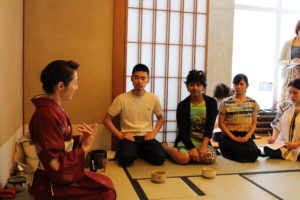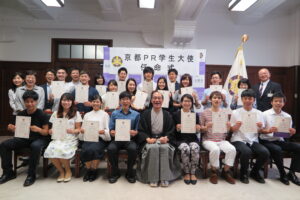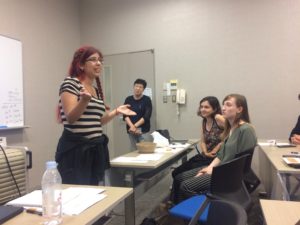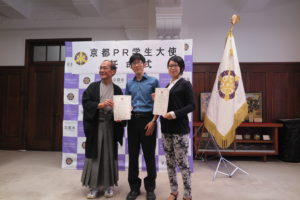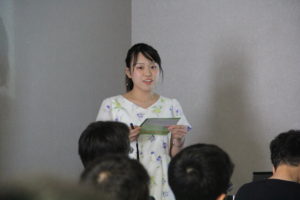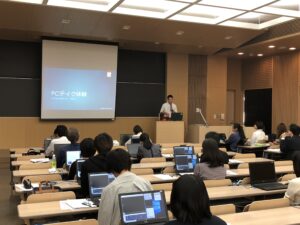number
1
minute
department
meeting |
Teaching IR: How to Use Data from Case Studies
Capacity: 160 people→ 180 people (priority capacity: 95 people)* The capacity has been increased.
In this subcommittee, we will take up “IR related to education,” that is, “efforts to collect, provide, and analyze information on education in general, analyze data, and formulate and support educational policies” (from the definition of IR in education at Ryukoku University). Specifically, we would like to have students report on examples of actual use of data from student surveys and other data in the field of teaching and learning, such as class improvement, as case studies, and consider specific measures to improve internal assurance in teaching.
≪ Reporter≫
Hitoshi Yamashita (Professor, Research and Development Center for Higher Education and Admissions, Osaka University)
Dr. Kai Hatano (Associate Professor, Center for Higher Education Development, Osaka Prefecture University)
Ms. Riko Koyama (Associate Professor, Kyoto Koka Women’s University Junior College)
Kazuhiro Fujita (Dean, Faculty of Science and Technology, Ryukoku University)
≪ Coordinator≫
Masato Takimoto (Professor, Faculty of International Studies, Ryukoku University)
|
number
2
minute
department
meeting |
How to Promote Reform and Improvement of Faculties and Departmental Education
Capacity: 160 people (priority capacity: 95 people)
In this subcommittee, we would like to deepen the discussion on middle-level FD, which is how to promote the improvement of education at the level of faculties and departments. The speakers will talk about examples of how they have actually improved education at the faculties and departments in the fields of humanities (literature), social sciences (economics and management), and natural sciences (physical therapy), and think together with the participants about who should improve education at the faculty/departmental level.
≪ Reporter≫
Kyoko Matsuura (Dean/Professor, Faculty of Letters, Kyoto Tachibana University)
Keiichi Yamamoto (Dean/Professor, Faculty of Economics and Business Administration, Hokuriku University)
Tomoko Hirayama (Associate Professor, Faculty of Health Sciences, Aino University)
Yugo Saito (Assistant Professor, Faculty of Medical and Health Sciences, Aino University)
≪ Coordinator≫
Takero Nishino (Lecturer, Center for Educational Development, Kyoto Tachibana University)
|
number
3
minute
department
meeting |
Support and Initiatives to Promote Student Engagement and Independence
~From the standpoint of a professional who is involved with students~
Capacity: 160 people (priority capacity: 95 people)
In this subcommittee, we will report and examine support and strategies for promoting student engagement and independence at universities from three different professional perspectives: academic advising (learning and university adaptation), psychological counseling (psychology and development), and career support (career choice). In each of these initiatives, I would like to understand how the relationship between students and supporters is built, and the quantity and dynamics of involvement in each initiative from the perspective of student engagement. In the end, participants will share and examine the current situation, problems, and solutions of how to interact with students in classes, seminars, and various support situations that each participant encounters on a daily basis.
≪ Reporter≫
Eiko Shimizu (Associate Professor, Institute for Basic Education, Otemon Gakuin University)
Dr. Yasushi Sugihara (Director, Counseling Room, Center for Student Support, Kyoto University, Professor)
Akihiko Iejima (Lecturer, Institute for the Promotion of Comprehensive Education, Osaka University / Deputy Director, Career Center)
≪ Coordinator≫
Takeshi Yamada (Associate Professor, Center for Research and Development in Higher Education, Kyoto University)
|
number
4
minute
department
meeting |
Educating Students through University Regional Cooperation
Capacity: 30 people (priority capacity: 18 people)
Collaborative activities between universities and local communities have benefits for both research, human exchange, and industrial revitalization, and when students participate in these activities, the community becomes a field where hands-on and practical learning can be conducted, and educational effects can be expected to be great. On the other hand, it seems that faculty members are faced with different challenges and burdens in collaborative activities than in regular lectures. In this subcommittee, we will introduce examples of collaborative activities with keywords such as collaboration in fields outside the teacher’s area of expertise, utilization of student shops, and collaboration with distant regions, and consider how to proceed with effective education based on the strengths and issues.
≪ Reporter≫
Masato Okura (Associate Professor, Faculty of Contemporary Social Studies, Doshisha Women’s University)
Yoshio Fujikawa (Professor, Faculty of Economics and Business Administration, Kyoto Gakuen University)
Tomohiko Nakamura (Professor, Faculty of Economics, Kobe International University)
≪ Coordinator≫
Hiroyuki Iguchi (Lecturer, Faculty of Bio-Environmental Studies, Kyoto Gakuen University)
|
number
5
minute
department
meeting |
Special Needs School Teacher Training
Independent Learning and Regional Collaboration
Capacity: 30 people (priority capacity: 18 people)
In Japan, which aims to build an inclusive education system by promoting special needs education, there is an urgent need to train teachers with expertise in special needs education. In particular, it is important to have experience in the school setting in order to obtain a special needs school teaching license.
Therefore, I would like to think together with the participants about “opportunities for students to experience the actual teaching profession” and “independent learning” at universities with various backgrounds such as establishment, size, and history.
≪ Reporter≫
Hiromi Kotani (Professor, Faculty of Education, Kyoto University of Education)
Noboru Niwa (Professor, Faculty of Education, Kwansei Gakuin University)
Katsuhiro Kanamori (Professor, Faculty of Sport Sciences, Japan Fukushi University)
≪ Coordinator≫
Yoji Ota (Associate Professor, Faculty of Contemporary Human Studies, Kyoto Notre Dame University)
|
number
6
minute
department
meeting |
Educational reform using LMS (Learning Management System)
Capacity: 30 people (priority capacity: 18 people)
With the spread of smartphones and tablets and the enhancement of the Internet environment, education is also undergoing major changes. The introduction of LMS (Learning Management System) has also created various benefits at universities, such as more efficient lectures, paperless operations, more efficient paperwork, and closer communication between students and faculty. In this subcommittee, we will invite teachers who are using LMS to introduce examples of their use, advantages and disadvantages, and points to note when using them. We would like to discuss how to further utilize LMS in improving education in the future.
≪ Reporter≫
Takashi Sakamoto (Associate Professor, Department of General Education, Kyoto University of Pharmaceutical Sciences)
Kazuharu Abe (Professor, Faculty of Career Development, Kyoto Koka Women’s University)
Hiroyuki Sakai (Associate Professor, Center for Research and Development in Higher Education, Kyoto University)
≪ Coordinator≫
Masataka Oda (Professor, Department of Biopharmaceutical Sciences, Kyoto University of Pharmaceutical Sciences)
|
number
7
minute
department
meeting |
Science and Engineering Co-op/Internship Education
Collaboration and growth among students, business people, university faculty and staff
Capacity: 30 people (priority capacity: 18 people)
An internship at a university or other institution (hereinafter referred to as an internship) is a system in which students gain work experience related to their major and future career at a company. This subcommittee will be a place to examine and explore better internships not only for students, but also for universities and companies, from the perspectives of design, management, and sustainable development, based on practical examples of internships at the Faculty of Information Science and Technology, Kyoto Sangyo University, and the future vision of the Faculty of Science and Engineering of Tokyo Denki University and the Faculty of Life Sciences of Kyoto Sangyo University.
≪ Reporter≫
Kohiro Ogino (Associate Professor, Faculty of Information Science and Technology, Kyoto Sangyo University)
Dr. Seisuke Kimura (Professor, Faculty of Integrated Life Sciences, Kyoto Sangyo University / Director, Center for Career Education)
Reimune Nagahara (Professor, Faculty of Science and Technology, Tokyo Denki University)
≪ Coordinator≫
Kenichi Sato (Professor, Faculty of Integrated Life Sciences, Kyoto Sangyo University)
|
number
8
minute
department
meeting |
Creating a University Friendly to Sexual Minority Students
Capacity: 30 people (priority capacity: 18 people)
I would like to have the opportunity to think about how a university should be friendly to sexual minority students from the perspectives of faculty and students from the perspectives of the people concerned. In addition to reporting on efforts in other countries by professors with international experience, we will ask about the efforts in their own regions and the status of efforts at universities nationwide. On top of that, I would like to listen to the requests and actual circumstances of the students involved, and explore the future of a university where everyone can feel comfortable.
≪ Reporter≫
Makiko Kasai (Professor, Faculty of Basic and Clinical Education, Naruto University of Education)
Shoko Sasaki (Associate Professor, Faculty of Letters, Meiji University)
Mr. Yuichi Matsuda (Kansai University, Administrative Bureau, Staff)
≪ Coordinator≫
Koichi Takaishi (Professor, Faculty of Clinical Psychology, Kyoto Bunkyo University)
|
number
9
minute
department
meeting |
Thinking about the state of education in the Faculty of Life Sciences
Capacity: 30 people (priority capacity: 18 people)
Many of the faculties of life sciences are structured to allow interdisciplinary learning by consolidating various fields of life sciences in various faculties such as medicine, pharmacy, agriculture, engineering, etc. into a single faculty. In this subcommittee, we will introduce a wide range of topics related to this interdisciplinary learning guidance system, such as distinctive initiatives and problems, collaboration among faculty members, undergraduate education curricula, FD initiatives, etc., based on the case studies of each university. It is expected that there will be a discussion on the future of the Faculty of Life Sciences and the state of education in the field of life sciences.
≪ Reporter≫
Dr. Hideshi Inoue (Dean/Professor, Faculty of Life Sciences, Tokyo University of Pharmacy and Pharmaceutical Sciences)
Yasuhiro Inada (Professor, Faculty of Life Sciences, Ritsumeikan University)
Dr. Tetsuo Ota (Professor, Faculty of Biomedical Sciences, Doshisha University)
Dr. Shoichi Ishiura (Distinguished Visiting Professor, Faculty of Biomedical Sciences, Doshisha University / Professor Emeritus, The University of Tokyo)
≪ Coordinator≫
Miho Takahashi (Assistant Professor, Faculty of Biomedical Sciences, Doshisha University)
|
number
10
minute
department
meeting |
Study Group to Promote Active Learning
– Classroom experiences in elementary and junior high schools and independent and collaborative classes at universities –
Capacity: 30 people (priority capacity: 18 people)
I would like to experience the classes that are currently being taught in elementary and junior high schools, and think about hints for incorporating active learning (proactive, interactive, and deep learning) into university classes.
What kind of teaching methods and contents can be considered to implement independent and collaborative classes at universities? We would like to hold a class using a clicker and make it a place for participants to think together while experiencing it as a student taking the class.
Keywords: Lesson Improvement, Active Learning, Proactive, Interactive and Deep Learning
≪ Reporter≫
Masanobu Yamakawa (President, Takarazuka University)
Yuka Masuda (Principal, Kofudai Elementary School, Toyono-cho, Toyono-gun, Osaka)
Mr. Shinichi Inoue (Osaka City Board of Education Secretariat, Osaka City Education Center, Supervisor in charge of Education Promotion)
Dr. Ogawa (Associate Professor, Faculty of Contemporary Human Studies, Kyoto Notre Dame University)
≪ Coordinator≫
Toyosei Hirata (Associate Professor, Faculty of Education, Bukkyo University)
|
number
11
minute
department
meeting |
Current Status and Issues of Educational Support for Students with Disabilities
Capacity: 30 people (priority capacity: 18 people)
This subcommittee will examine the following three points.
(1) Reasonable Accommodations Required in Institutions of Higher Education ~Consideration from the Recommendations of the Ministry of Education, Culture, Sports, Science and Technology Advisory Committee~
(2) What is necessary to practice education based on reasonable accommodation for students with disabilities ~ Examination of what educational institutions should do to eliminate discrimination and prejudice and guarantee education for students with disabilities ~
(3) Educational Practice Report Based on Reasonable Accommodations at Educational Institutions ~ Examination of Achievements and Issues through Practice Reports for Students with Disabilities at Educational Institutions ~
≪ Reporter≫
Kakujun Asahina (Professor, Faculty of Letters, Otani University)
Mr. Ichiro Nakamura (Principal Supervisor, Comprehensive Development Support Division, Kyoto City Board of Education)
Akio Miyoshi (Professor, Faculty of Contemporary Human Studies, Kyoto Notre Dame Women’s University)
Manabu Yamazaki (Otani University, Student Support Department, Career Center)
≪ Coordinator≫
Masato Yasuda (Professor, Faculty of Education, Otani University)
|














